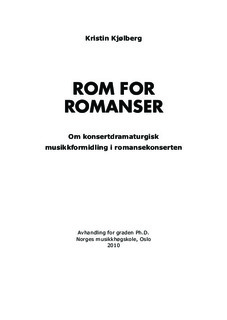| dc.description.abstract | The main topic of this dissertation is concert dramaturgy, and the aim of
the research project has been to develop theory of the different aspects of
singers´ performance in the song recital.
Concert dramaturgy is a categorywithin the wider field
musikkformidling. The Scandinavian term musikkformidling cannot be
precisely translated into English. It is about music communication in the
service of different concepts, and is in the dissertation divided into three
aspects. The first aspect is related to the musician’s interpretation and
performance of a piece of music. The second concerns presentations of
musical works, ideas or practises through representational medias such as
recordings, written texts, verbally or through digital medias. The third
aspect, concert dramaturgy will often consist of elements from the two
other categories.
Thus, concert dramaturgy encompasses artistic, rhetorical and
communicative aspects of the concert. In order to facilitate aesthetic
experience for the listener, a musician or a concert dramaturge will work
with staging, paratexts and contexts, as well as the dramaturgical form of
the concert. Further, the performers appearance in the concert is of great
importance for the performance. The rhetorical phase actio is transferable
to the performers appearance due to the performance of the composition,
verbal and nonverbal communication, and the performers presence and
charisma on the stage. Concert dramaturgy is also about the
communication between the performers and the audience. Christopher
Smalls concept musicking and Hans Georg Gadamers term play has
influenced how researcher look upon the classical concert in general and
the song recital in particular.
The dissertation presents a practice-based research project in music,
and the empirical material is developed through the methodological
framework of action research. The researcher, also being a classical
singer, has performed three staged song recitals: “Alma Mahler, muse,
femme fatale and composer” with art songs by Viennese composers from
370
the period 1900-1930, “Last night at half past nine he seemed O.K.”,
including cabaret songs, and “Das war der Tag der weißen
Chrysanthemen” with art songs by Berg, Schönberg, Webern and
Zemlinsky.
By moving back and forth between the positions as a researcher and
a singer, theories related to concert dramaturgy has been developed in
dialogues between the empirical material derived through planning,
acting, observing, analyzing and reflection on the one hand, and theories
from communication theory, rhetoric, and theory from fine art and theatre
on the other. | en_US |

